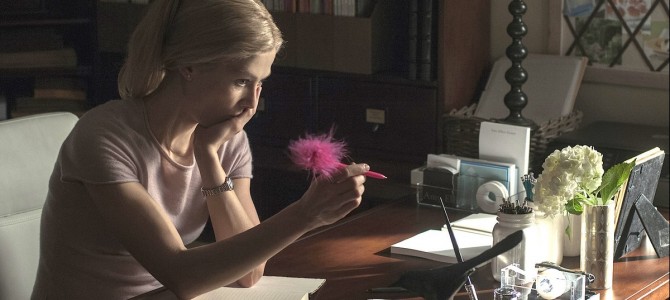“Gone Girl” is an exciting, suspenseful thriller that keeps its audience enthralled from opening to credits. Nearly everyone seems to agree on that.
But is it misogynistic? Talking heads find consensus harder on that question.
In a year of overhyped artsy movies and lackluster blockbusters, “Gone Girl” is just what we’ve been missing. It boasts flawless direction from David Fincher, A-level acting from Rosamund Pike and Ben Affleck, and a story that just won’t let you go. If you like R-rated psychological thrillers and don’t want the story revealed for you, stop reading now until you’ve seen the film.
Seriously, just about any description of this movie—characters and their motivations, presence or absence of legal counsel, maybe even the cat—gives away major plot points. Reader beware: Spoilers below.
As the story opens, Amy (Pike) and Nick (Affleck) prepare to celebrate their fifth anniversary. It’s a match born of sophisticated cocktail parties in Manhattan, she a literary trust-fund child, he an aspiring Midwest transplant.
Nick had met an Amy who appears to be charming, intelligent, successful, self-deprecating. Her classic beauty and effortless style are just icing on the cake. She’s introspective without being self-absorbed, loving without being precious, rich without being snobby. Nick’s Amy is the sophisticated woman in every luxury car commercial, the ideal guest at every soirée, the ultimate woman who has it all.
And then Amy disappears, under suspicious circumstances.
The twist of this story is that Amy is not and never has been the woman Nick thought he married. Instead, she’s the kind of megabitch who would meticulously frame her husband for murder and even plan on killing herself just to drive the point home.
All the elements of a classic sociopath, in an elegantly clad body.
There is no doubt that Gillian Flynn, the author of both the novel and screenplay, turns this idealization of the modern woman on its head. Amy turns herself into, as she bitterly says in a monologue, the “cool girl.” She creates a woman that a guy like Nick would want. But Amy is not cool. She’s just good at faking cool.
Cue The Tired Female Victim Trope
Even with all this playing with type, perhaps because of it, only those who think of women as nothing more than perpetual victims would think the story is anti-woman.
Amy is, in a sick and twisted way, the ideal of feminism. She holds all the power and wields it without mercy. Her money, her intelligence, her independence, all are nothing more than tools toward her goals. She asks no permission, depends on no one. Even her femininity acts as a weapon. She appropriates and exploits the language of victimhood, even the law designed to prevent victimhood, to damage men.
The hunted has become the hunter.
As it turns out, a fully actualized woman acting at the height of her power can choose to do bad. Individuals know this, and know that some women can’t be trusted, just as some men can’t be. Courts know this, that women sometimes lie about abuse and rape to gain an advantage over their adversary.
The only ones who don’t seem to acknowledge that women sometimes lie and cheat are public policy debaters and academics. They insist women are victims. All people are defined by the context of their class and not the content of their character. End of story.
Flynn certainly has no qualms about writing female villains: “Some of the most disturbing, sick relationships I’ve witnessed are between long-time friends, and especially mothers and daughters. Innuendo, backspin, false encouragement, punishing withdrawal, sexual jealousy, garden-variety jealousy — watching women go to work on each other is a horrific bit of pageantry that can stretch on for years. Libraries are filled with stories on generations of brutal men, trapped in a cycle of aggression. I wanted to write about the violence of women.”
She writes women as fully human, potentially ugly, real people. She might not be an ideal wife, but as a story character, Amy is perfect.








